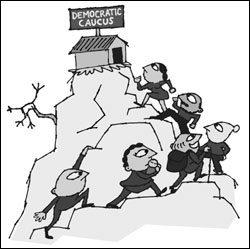IN LESS THAN a month, on Feb. 7, Washington Democrats will hold caucuses across the state to determine who state Dems will support for president at next summer’s convention. The total reliance on caucuses to select party delegates comes after the state Democratic party scrapped, as “too confusing,” a plan to pick delegates through a combination of caucus results and a primary election on March 2. After the Democrats changed plans, and with the Republican nominee already set this year, the Legislature in December voted to cancel the primary. If you want to make your preferences known for our next president, and you want to do so before Nov. 2, your only meaningful chance will come if you go to your local caucus meeting next month.
Not all that many people bother to mail in a ballot or trudge to the polling place on an election day. Far fewer know where their local party caucuses will meet, let alone are motivated to show up. And plenty of voters don’t identify with a particular party in the first place. The result: Our state’s contribution to the national candidate selection process is not likely to reflect the preferences of the much greater number of people inclined to vote for a Demo- crat in November.
Only three of the nine major Democratic candidates are making a major push in Washington, even though many analysts now list us as likely to be a critical “swing state” in November. By that calculus, it’s likely to be important that people considering a vote against George Bush feel that his Democratic opponent would actually do a better job. That’s hard to judge if we seldom see or hear from candidates. The two who have visited Washington the most (usually the Seattle area, where most of the big donors live) are Howard Dean and Dennis Kucinich. Not coincidentally, Dean and Kucinich are the only two candidates generating any kind of buzzdrawing enthusiastic and loyal volunteers and generating excitement when they come to town.
Kucinich and Al Sharpton play similar roles with their candidacies. Both draw most of their appeal from narrow constituencies (peaceniks and nonwhite people, respectively). Despite being ignored or ridiculed by media, both challenge the assumptions of Dubya’s domestic and foreign policy agendas in ways that most gutless Democrats don’t dare. Neither has a chance in hell of getting the nomination, but their bluster on Howard Dean’s left flank helps make the success of his campaign possible.
Sharpton’s appeal is mostly back East, but there are plenty of Church of Dennis adherents in Seattle, folks with the motivation and fervor to go to caucus meetings, friends in tow. Even though he’s much more a centrist, Dean’s volunteer base has some of the same characteristics. Alone among leading candidates, he has positioned himself outside the party and Beltway establishment, and he has courted a not-always-deserved reputation for plain speaking. More important, unlike Kucinich, Dean’s fans expect him to get the nominationand beat Bush.
Mainstream Democrats at the national level, particularly the leadership apparatus put in place by Bill Clinton, aren’t so sure. Pundits and Republicans have been playing up the notion that Dean is a far-left liberal (which he’s not), and that he’d be buried ࠬa McGovern in a race against Dubya. Karl Rove is said be in full chop-licking mode over a Dean candidacy.
IS THAT ACCURATE or fair? An awful lot of the Democrats, independents, Greens, and assorted others who’d like to see Bush 43 follow his father into one-term oblivion are highly motivated by the question of electability. On that score, Dean has doubters; Kucinich is off the charts. Yet both will do very, very well in Washington’s Democratic caucuses next month, reflecting not who a majority of Democrats (or Bush opponents) would like to see run, but who the true ideologues are motivated to support.
Between the caucus system, candidate reliance on the media, and the media’s use of fund-raising prowess as a bellwether, most of the important decisions in the presidential campaign have been taken out of our hands. In 2000, Gore and Bush had their nominations wrapped up by now. This year offers a rare opportunity. Several candidates still have a reasonable shot at getting the nominationbut only if we track down where our local precinct’s causes are next month, and we show up and cast a vote there. Unless lots of us do that, the results of next month’s caucuses are not likely to be anything close to how Democrats would vote if given the chance.







